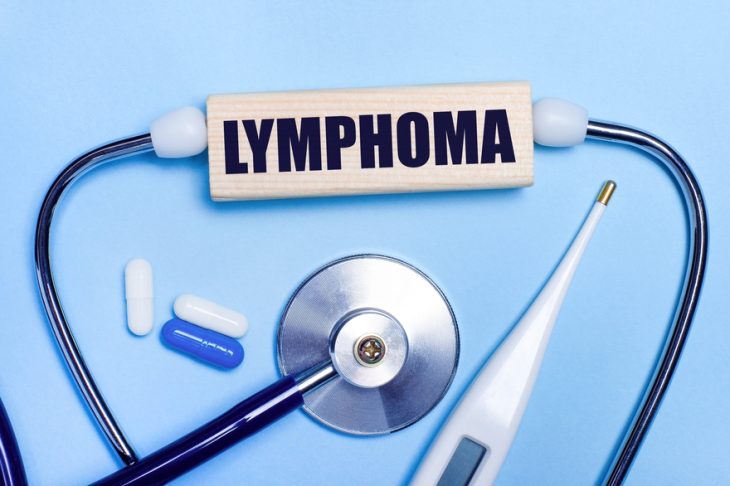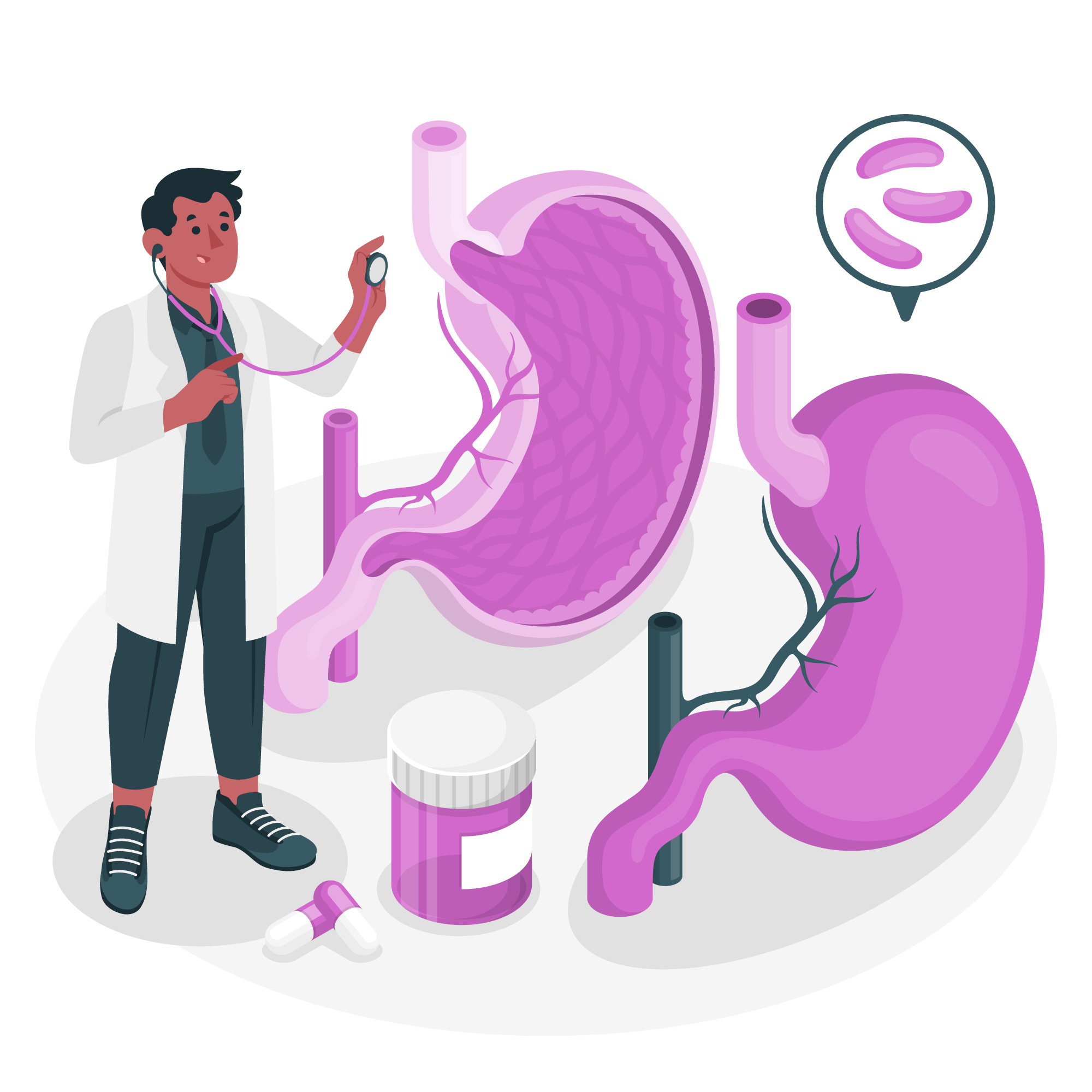
Can Stomach Ulcers Increase the Risk of Stomach Cancer? Exploring the Evidence
Stomach ulcers, or peptic ulcers, are painful sores that develop in the stomach’s lining. They are a common gastrointestinal condition that affects millions of people worldwide. While they can cause significant discomfort and require medical attention, a frequently asked question is whether these ulcers can lead to a more serious condition: gastric cancer. This blog explores the link between stomach ulcers and stomach cancer, examining the underlying causes, risk factors, and ways to mitigate the potential risks.
What Are Stomach Ulcers?
Stomach ulcers, or peptic ulcers, are sores that form on the inner stomach lining. They happen when the protective mucus layer that shields the stomach lining from harsh gastric acid is compromised. Without this layer, the acid erodes the stomach’s lining, causing ulcers. The common symptoms of stomach ulcers include burning pain, bloating, heartburn, nausea, and in severe cases, vomiting blood or black stools.
The two primary causes of stomach ulcers are:
- Helicobacter pylori (H. pylori) infection: This spiral-shaped bacterium is found in the stomach lining and can disrupt the mucus barrier, making the stomach lining more susceptible to damage from stomach acid.
- Long-term use of NSAIDs: Nonsteroidal anti-inflammatory drugs (NSAIDs), such as aspirin and ibuprofen, can irritate or harm the stomach lining and lead to ulcer formation.
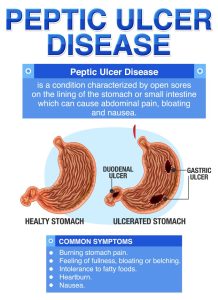
Understanding Stomach Cancer:
Stomach cancer, also known as gastric cancer, is a kind of cancer illness that originates in the cells lining the stomach. It is regarded as the fifth most common cancer globally and is a common cause of cancer-related death. Symptoms of stomach cancer may include continuous stomach pain, unintentional weight loss, difficulty swallowing, and feeling full after eating only small amounts of food. Unfortunately, stomach cancer is often diagnosed in advanced stages due to its vague and non-specific symptoms.
Some risk factors increase the chance of getting stomach cancer, but the exact cause of the disease is not known, such as a diet high in salty or smoked foods, smoking, a family history of stomach cancer, and infections like H. pylori.
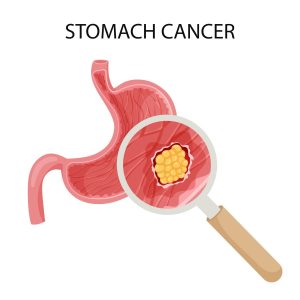
Is There a Link Between Stomach Ulcers and Stomach Cancer?
The relationship between stomach ulcers and stomach cancer is complex and depends largely on the underlying cause of the ulcer. While stomach ulcers themselves do not directly cause stomach cancer, but the risk of developing gastric cancer can be increased by ulcer-related conditions –
- H. pylori Infection: A Significant Risk Factor
- The most notable link between stomach ulcers and stomach cancer is the presence of H. pylori infection. This bacterium not only contributes to ulcer formation but is also classified as a Group 1 carcinogen by the World Health Organization (WHO) due to its strong association with gastric cancer.
- Chronic inflammation of the stomach lining can occur as a result of H. pylori infection lining, leading to changes in the stomach’s cellular structure. In the long run, this chronic inflammation can lead to precancerous changes and, eventually, gastric cancer.
- It is essential to remember that not all individuals who are infected with H. pylori will develop stomach cancer. Many factors, including genetics, diet, and overall health, determine the risk of developing this disease.
2. NSAID-Induced Ulcers and Cancer Risk
- Unlike H. pylori-related ulcers, those caused by long-term use of NSAIDs do not show a significant direct link to stomach cancer. However, chronic NSAID use can still have serious health implications, such as gastrointestinal bleeding and complications that require medical intervention.
- While NSAID-induced ulcers may not lead to cancer, the chronic inflammation and irritation they cause may contribute indirectly to a less healthy stomach environment, making regular monitoring important.
Other Factors That Increase the Risk of Stomach Cancer:
Besides H. pylori infection, other factors could increase the risk of developing stomach cancer disease:
- Diet: The risk of stomach cancer can be raised by eating a diet heavy in salt, smoked or pickled foods, and fewer fruits and vegetables. The stomach lining is protected against damage by the antioxidant richness of fresh fruits and vegetables.
- Genetics: The risk is higher if there is a family history of stomach cancer. Specific genetic mutations are connected to a higher likelihood of developing gastric cancer.
- Lifestyle: Damage to the stomach lining and an increase in cancer risk can be caused by smoking and excessive alcohol consumption.
- Pre-existing Conditions: Conditions like chronic gastritis, pernicious anaemia, and intestinal metaplasia can make an individual more susceptible to stomach cancer.
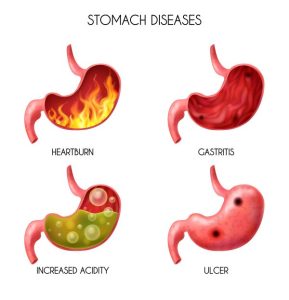
Can Treating Stomach Ulcers Reduce Stomach Cancer Risk?
Effectively treating stomach ulcers, particularly those caused by H. pylori, can decrease the risk of developing stomach cancer. The standard treatment for H. pylori infection is a combination of antibiotics and proton pump inhibitors (PPIs) to eliminate the bacteria and reduce stomach acid. Eradicating H. pylori has been shown to significantly lower the risk of gastric cancer in individuals with chronic H. pylori infection.
For those with ulcers caused by NSAIDs, the treatment typically involves discontinuing the offending medication (if possible) and using medications like PPIs or H2 blockers to promote healing.
Preventing Stomach Ulcers and Stomach Cancer:
While it is not always possible to prevent stomach ulcers or stomach cancer, certain lifestyle changes can help reduce the risk:
- Regular Medical Check-ups: If you have a history of stomach ulcers or H. pylori infection, regular medical check-ups and monitoring are essential. Early detection of any changes in the stomach lining can make a significant difference in treatment outcomes.
- Healthy Diet: A healthy diet with fruits, vegetables, and whole grains, and low in processed, salty, or smoked foods, can help protect the stomach lining and reduce cancer risk.
- Avoid Smoking and Limit Alcohol: The risk of ulcers and stomach cancer is significant due to smoking and excessive alcohol consumption. Quitting smoking and drinking alcohol in moderation, if at all, can have substantial health benefits.
- Proper Use of Medications: If you need to use NSAIDs for pain management, discuss with your doctor about using the lowest effective dose and possibly combining it with medications that protect the stomach lining.
When to See a Doctor?
If you experience persistent stomach pain, unexplained weight loss, difficulty swallowing, or vomiting blood, it is crucial to seek medical attention. Early diagnosis and treatment of both stomach ulcers and potentially precancerous changes can greatly improve outcomes.
Conclusion:
Stomach ulcers, particularly those caused by H. pylori infection, can increase the risk of developing stomach cancer over time. While ulcers themselves are not cancerous, they create conditions that can lead to cancer. If you have been diagnosed with stomach ulcers, it is essential to work closely with your healthcare provider to manage the condition effectively and lower your risk. At Omega Hospitals, we provide comprehensive care and advanced treatment options for both stomach ulcers and gastric cancer, prioritizing your health and well-being.
The difference can be made by being proactive, remaining educated, and getting medical attention as soon as possible. Keep in mind that improved results depend on early detection. Keep yourself informed and healthy!

